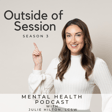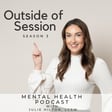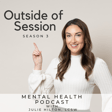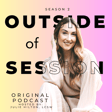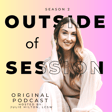Become a Creator today!Start creating today - Share your story with the world!
Start for free
00:00:00
00:00:01

What Sabotages Weight Loss?
Black and White thinking. That’s what! On this week’s episode, Julie explores how learning to live in a “gray” area is the thing that’s missing from your weight loss plan.
Connect with me!
@empower_counseling
www.empowercca.com
Transcript
Introduction to Julie Hilton's Podcast
00:00:06
Speaker
Welcome to outside of session. I'm your host, licensed clinical social worker and therapist BFF, Julie Hilton. We're going to cover all the things here, whether it's mental health, entrepreneurship, relationships, trauma, or just life. Nothing is off limits. Hopefully you'll laugh a little and learn a lot, but most importantly, feel encouraged on your journey to live empowered.
Fear of Controversy in Sensitive Topics
00:00:32
Speaker
Hey friends, welcome back. Does anyone else ever feel like you're getting ready to do something and there's this feeling of no matter what you say, you know, somebody is not going to like it.
00:00:49
Speaker
Like that little voice saying like, you know, somebody's going to have a problem with this. Well, I don't know why, but I'm, you know, getting ready to record today's episode. And we're in the midst of talking about mental health and weight loss. And all I can think of is that this is going to piss a lot of people off.
Addressing Challenging Subjects
00:01:09
Speaker
And in the past, when I have felt this way, I have shied away from those topics and those conversations and like sharing my opinion. But I'm not going to do that anymore. At least not today. And so maybe it's just me. Maybe it's just like what I'm
00:01:26
Speaker
projecting onto other people and I'm expecting from people. Um, but I feel like this is a conversation that we need to be talking about more and I'm, I'm just ready to put myself out there and ready to
Mental Health and Weight Loss: A Recap
00:01:38
Speaker
talk about it. So last week we talked about is it ever possible to lose weight and it not be terrible for your mental health.
00:01:47
Speaker
And if you didn't listen to that episode, please go back and like catch up on that one first before you listen to today's episode, because we really explored last week, like who I don't think it's good for and what kind of like parameters there are for people who I do think it's possible to do it in a way that's not bad for your mental health. So if you didn't listen to last week's episode, go check that one out first.
Healthy Weight Loss vs. Mental Unhealthiness
00:02:13
Speaker
And then today I want to talk to
00:02:17
Speaker
The people who I think fit into that yes category, like yes I can, I think it can be done in a way that's not bad for your mental health. And specifically today I wanna talk about what I think typically causes people in that yes category to end up taking a hit to their mental health or getting to an unhealthy place with it. And they end up needing to take a step back from dieting because it has gotten to an unhealthy place.
00:02:46
Speaker
Um, so that's what I want to talk about today.
Self-Sabotage and Weight Loss Book Journey
00:02:49
Speaker
And this ties directly into one of the questions that I got on my Instagram a couple of weeks ago. Someone asked about like, why do we sell sabotage on our weight loss journeys? So that goes like hand in hand with it. So we're going to jump into that today. Um,
00:03:09
Speaker
And you know what? I'm going to go ahead and like put this out there. I wasn't necessarily planning on talking about this today. Um, but who cares? I'm going to go ahead and say it. I actually want to write a book about this.
00:03:24
Speaker
In fact, I've already started writing a book about this. And for some reason, that feels really vulnerable for me to put out there. The book itself has kind of been put on the back burner recently, because I decided to go ahead and start this podcast. And then I started another freaking business, which I'll tell you about one day that I'm working on getting up and running. So needless to say, I've been really busy lately and not busy writing this book.
00:03:54
Speaker
But I literally had written like, I don't know how many pages like, it was at least like 25,000 words already written, which if you've ever had to write a paper for college and a 500 word essay feels like a lot, imagine doing 25,000 words already. So I'm well on my way into it.
Black and White Thinking in Weight Loss
00:04:13
Speaker
But I want to talk about today what the book is actually going to be about this very topic of why do we sell sabotage on our weight loss journeys? And
00:04:23
Speaker
The thing that I think sabotages most people on their weight loss journey is, I feel like it's that we get too black and white with our thinking and we don't know how to operate in a gray area. Like in a nutshell, that's what I think it is. So here's what I mean. How many of you have started fresh on Monday?
00:04:52
Speaker
Once again, Monday is day one and you start all the things over on Monday. You start counting and tracking and prepping and stepping. And you set all of these goals like I'm going to get 10,000 of those and I'm going to do 45 minutes of HIIT exercise.
00:05:14
Speaker
And at that point you need like, you're drinking, you're chugging so many gallons of water that you just need a catheter place so that you don't have to get up and go to the bathroom every five minutes for all this water that you're chugging. So like that's Monday, right? And then Tuesday is mostly the same.
00:05:32
Speaker
And then Wednesday starts to get a little bit stressful. So you forget to do like maybe one of those things. And then Thursday is exhausting. So you start to lose your grip on things. And then by the time Friday gets here, it's the freaking weekend and all you need is some fun and something easy and something that makes you feel good.
00:05:55
Speaker
And then Saturday and Sunday are like this blur. And then Sunday night comes and it's that oh shit feeling. And you go into that mode of get it together and tomorrow, which would be Monday, is day one all over again.
00:06:15
Speaker
And sometimes it might be a weekly cycle like that of like a Monday through Sunday things. Sometimes it might last a little bit longer and go through like a couple of weeks or a month. But regardless, it's still that same cycle of things seem to go from one extreme to another, right?
00:06:32
Speaker
And by the way, I'm not calling anybody else out here about anything that I haven't done myself. So please just know that yes, I have repeated that cycle over and over again. So I'm with you on that. And to be honest, that's why I'm talking about this right now. And that's why I want to write this book is because it's something that I know so well. And I've been really determined in my life to break those patterns,
00:07:00
Speaker
and not be so hard on myself. So all of these episodes are me really just sharing with you what I've learned and what's been really good for me. Um, but also remember that you have to find what works for you. So just like I was talking about in the last episode, take what resonates and what feels like it aligns with you and leave the rest because you always have to know what's best for yourself. And no one person knows that for you better than you know it for yourself.
The Monday Mindset of Self-Sabotage
00:07:31
Speaker
So going back to this pattern of like this Monday through Sunday cycle, right? Like historically, we probably would look at Friday, Saturday and Sunday as the problem. Like those are the days that we see ourselves as being self-sabotaging. We're like sabotaging our plan, right?
00:07:53
Speaker
Those are the days that we end up feeling guilty about or shame about. Those are the days that they, that feel like they're out of our control, but just like follow me here. This is the most important thing I can say about this. I have finally realized that Monday is the problem.
00:08:17
Speaker
It's our Monday mindset that we need to dismantle and work on because Monday is so strict and it's so rigid and it sucks. Monday is the like on the wagon. I'm being so quote unquote good.
00:08:40
Speaker
But there's no room for error. It's that mindset that is so freaking toxic. And that is when we start to self-sabotage ourselves, when we go back into that mindset. And a lot of people, by the way, have come to this conclusion, like I did not come up with this. A lot of people even know the saying that binges always follow a period of restriction. And that's something that's really well known in the,
00:09:08
Speaker
like eating disorder recovery world especially if you have like a diagnosable binge eating disorder um like you'll always hear therapists that work in that realm say that um binging is not the problem it's the restriction that
00:09:25
Speaker
was before the binge that's the actual problem. So this isn't anything new. Like I didn't come up with it, but it can also be applicable to people who aren't necessarily to the extreme of like an eating disorder. And so I don't think we apply it very commonly to just the cycle that a lot of us find ourselves in.
00:09:45
Speaker
And what I realized is that I don't see people finding ways to define that gray area for themselves. So really or truly all we know is black and white
Embracing Gray Areas in Thinking
00:09:59
Speaker
thinking. We don't know how to really operate any differently. Most of us just know that we're either on a diet or we're not.
00:10:07
Speaker
And so what I want to do today is to share some things that have been really, really good for me to help me find that balance for myself so that I can learn to operate not being in these extreme black or white thinking roles and to live a little bit more in like this great area that I'm talking about.
00:10:30
Speaker
And that is actually what the book is going to be about. It's going to be about understanding why this gray area is so hard. Why both of those extremes, um, those extreme ways of thinking are equally damaging, not just the like off the wagon days. Um, so that's actually what the whole book is going to be about. So I wanted to share with you today, just a couple of tips that I have that they have just like been game changers for me and the way that I approach.
00:10:59
Speaker
weight loss, diet, how I take care of myself, how I take care of my mental health when I'm thinking about like my body image and stuff like that. I just want to share a couple of those things.
Techniques Against Extreme Weight Loss Behaviors
00:11:08
Speaker
So the first thing that I would say is that I have learned to pay attention to my extreme thoughts and work really, really hard to like dethrone them.
00:11:24
Speaker
Um, and what I mean by that is like being able to recognize when I use words like I have to, like if I'm telling myself that I have to do something, I immediately challenge myself on it. So if I say something like I have to get 10,000 steps today.
00:11:43
Speaker
immediately no, immediately no. Like I have learned to say, um, no, there is nothing, there, there is nothing that says that the only way I'm going to reach my goals is if I hit 10,000 steps a day, right? Like I have learned that that is an extreme that I have like picked up over time and it's a little bit ingrained in me, but I'm learning to say, no, I do not have to get 10,000 steps today.
00:12:09
Speaker
Um, when I say something, it, when I hear myself say that like, that's bad, if I'm talking about like a food or a food group or something like that, I immediately tell myself, no, it's not. There are no bad foods. Like I love when people talk about like food has no morality. It just has different, um, it's just made up of like different nutrients, right? Um, so I call myself out when I find myself saying some of those really extreme
00:12:37
Speaker
black or white comments to myself. So that is really like the mindset shift that has been really important to me. So
00:12:49
Speaker
For instance, instead of paying so much attention to if I have a craving, right? Before I would say, I would think of that as being the thought that I need to steer clear of and feeling like that's what's toxic. So if I have a craving for something or if I'm thinking about how much I want a food, before I would say, oh my gosh, I'm gonna sabotage myself because I'm even thinking about it and I would force myself to steer clear of those thoughts.
00:13:19
Speaker
But now I have learned to recognize and pay more attention to the perfectionist tendencies that I have and make really conscious choices not to let them dictate my life. And I really have stopped and recognized how toxic those thoughts are.
00:13:38
Speaker
and realize that the more strict it is, the more toxic it is for me. Like the more extreme it is, the further you need to move away from it. And like the harder you need to work to say this doesn't have a place in my life anymore because that is too strict and too extreme. And that's going to be what leads me to saying like, F it later on because it's too strict and it's not sustainable. So that would be the first thing is to start to pay attention to your really extreme thoughts.
00:14:08
Speaker
and like label them appropriately, which is that they are really unhelpful on your journey. They're really toxic on your journey.
Setting Dietary Boundaries
00:14:18
Speaker
The second thing that has been really, really helpful for me is that I have learned to set boundaries for myself in both directions. So
00:14:29
Speaker
Like most of the time we know that when you're doing some kind of diet or doing some kind of like weight loss plan, you know that you have boundaries for setting limits for three limits for certain things. Um, like, especially like maximums. But I started setting boundaries for myself with minimums as well. So what I mean is like, okay,
00:14:53
Speaker
let's say the diet that you're doing is counting calories. And I know that that's not the only way to do it. And that's not what works for everybody. But whether you're counting macros or you're I don't know, like what else is out there? Like, whatever, I'm not going to throw out what I think is a good plan or not. But let's just say calories, right? Like most of the time when you're
00:15:15
Speaker
doing a calorie budget, you have a goal or a maximum that you're like quote unquote allowed for the day, right? Like that's how calorie counting works. So whether it's 16, 17, 1800, a hundred calories a day, whatever it is, um, which side note, please do not just jump to 1200 calories a day.
00:15:38
Speaker
I have been there before and I know so many of my friends have been there before, but 1200 calories is just like a number that has been floating around in our minds forever. And do you know that I read one time that when it comes to like, I don't know if it's like dieticians or nutritionists or even doctors, I don't know, that
00:15:59
Speaker
Whoever like oversees their license or whatever 1200 calories was the minimum number that they are ever like legally allowed to recommend to adults and so since that's the the minimum that they are supposed to recommend they just started recommending it for everybody and so whether you are
00:16:24
Speaker
five one, or you're five nine, like I am, and built a little bit more like athletic. None of that is taken into consideration and they just throw 1200 calories out for everyone. So please just like, please don't just default to that number just because it's been floating out there forever. Like that's pretty scary to think that there are these ideas that our bodies could function off of that. Anyways, I'm a little bit on a rant right now.
00:16:53
Speaker
But so what I'm talking about is like, we're used to having a maximum boundary. And I'm talking about setting a minimum boundary for yourself too. So if my let's say my calorie budget for the day, like my max is 2000, right, then I would also give myself a minimum of I don't know, say like,
00:17:14
Speaker
1700 calories a day, 1800, whatever it is. And I tell myself that I have to eat that many calories a day, even if at the end of the day I haven't really come close to it and I have plenty left. Like I tell myself like, no, this is my safeguard that I have put in place for myself. And it safeguards me from the idea that less is better or that it's even an option or it's acceptable on my journey.
00:17:42
Speaker
because I know that I have to do this minimum so that I don't fall back into any kind of like restrictive pattern. And y'all this alone has been a game changer for me because most of the time we
00:17:58
Speaker
fall off the wagon because we're so damn hungry, because we are not eating enough to take care of our bodies. And so telling myself that it is equally as important to eat enough as it is to eat in like a calorie deficit has been a game changer for me because it has
00:18:17
Speaker
helped me not to fall back into those patterns of feeling like less is better and it will get me to my goal faster because that those are the kind of extreme thoughts that I'm talking about calling out. And this is the kind of safeguard that I'm talking about developing for yourself so that you are protected against falling into some of those like black and white thinking patterns.
Reframing Extreme Dieting Behaviors
00:18:42
Speaker
And
00:18:43
Speaker
Here's a tip for both of those things, like the first and second thing that I talked about. What I have learned to do is to stop praising those extreme behaviors like so much of diet culture and myself in the past, I'm not saying that I'm not guilty of that, but to stop praising those extreme behaviors.
00:19:06
Speaker
So not just working to like dethrone them and get them out of your life, but to really take time to realize just how messed up they are. So for example, like I used to think that it was a good thing if I could come in under my calorie budget by the end of the day.
00:19:25
Speaker
Or if I could, like if I could get myself to skip out on dessert or get myself to pass up on eating out with my friends or something like that, I would call that willpower and I would feel good about it.
00:19:44
Speaker
And I got to a place of, of like, I have stopped idolizing those kinds of behaviors and I have started seeing them for what they really are, which that's disordered eating. It's, it's not good. It's not healthy, not for your body or for your mental health. It's not you having more like quote unquote willpower. That's actually you denying yourself something that's actually really, really important.
00:20:14
Speaker
So I made that switch to start to see that me wanting to, to like, enjoy myself more on the weekend or wanting to celebrate with friends, like that's not the quote unquote bad behavior.
00:20:31
Speaker
And being able to force myself, like what I could get myself to do on Monday, I stopped seeing that as good behavior. Instead, I have switched that and I have started to see that wanting to enjoy my life and wanting to have a little bit more fun on the weekend and wanting to be around people and celebrate and enjoy food, that is good behavior, that's fine. And it does not mean it's going to cost you your goals. And what I typically would have done on Monday,
00:21:02
Speaker
I have really started to see that as the toxic behavior and I have been able to switch that thinking so that what I do on Monday no longer sabotages my goals. Because if you are yo-yoing back and forth between trying to be perfect, which is not sustainable and so inevitably the weekend comes and those behaviors aren't sustainable,
00:21:29
Speaker
I have really been able to switch that to see Monday is the problem. Like literally right now, as I was like making show notes before I got ready to record this, it was lunchtime. And I had this thought of like, I'll just keep working through lunch because I don't want to stop. I'm like in a groove, you know what I mean? But the wiser part of myself, and I wasn't necessarily thinking that for like,
00:22:00
Speaker
Uh, like weight loss reasons, like thinking that it would get me, get me there faster, like trying to convince myself to skip a meal. I don't mean that. It was just easier for me in the moment to say like, I can power through and go ahead and knock this out. But that wiser part of me has learned to say like, no, go eat. You packed your lunch. You, you prepared it. You know, your body needs sustenance right now. So go take care of yourself.
00:22:23
Speaker
And so we have those tendencies even without realizing it of just sacrificing ourselves or denying ourselves what we need in the moment, out of convenience, out of guilt, for all different reasons. But what I'm saying is that the safeguards that I've learned to put in place are the ones that constantly help me to show up for myself better, right?
Integrating Mental and Physical Health Plans
00:22:49
Speaker
And then the third thing that I'll say is to have a mental health plan.
00:22:57
Speaker
as much as you have a physical health plan or like a diet plan. And that's what I talked about a little bit in last week's episode. So again, if you haven't listened to that one, just go back into listen to that for some of those tips, but basically like figuring out what your plan is to help you work against things that normally would take a toll on your mental health during this journey. And last time I gave like the example of
00:23:26
Speaker
how I've put in place some really good boundaries around the scale because the scale is something that can sabotage a lot of people on their weight loss journey. And I have found a way to like look at that completely different so that it, I have no emotional response to the scale anymore. Um, so go back and listen to that episode if you want a little bit more information about that. So that's kind of a summary that I wanted to give today of why do I think we sabotage? I think it's because
00:23:56
Speaker
We are too strict on ourself. We are too hard on ourself. It is not sustainable. And so it slings us to the complete opposite direction, which we call self-sabotage, but really it's that strict mindset in the beginning that was actually the sabotaging behavior. And the only way to get out of those extreme, those two extremes, like the black or white thinking is to create with this gray area,
00:24:23
Speaker
Can look like for you so that again that like your weight loss journey can be sustainable
00:24:30
Speaker
So that it too can actually be enjoyable too, because this should not be a short period of misery. Like that's not what weight loss should feel like. It should feel like baby steps that get you closer and closer to your goals. And it shouldn't just be about losing weight. It should be learning how to work on your mindset around, um, self-love and body image and all of those things as well.
00:24:56
Speaker
And those things don't come quickly. They don't. If they do, they're not going to last. And if they do, they're not really coming from a place of love. So that's all I have for today. If you like this episode, obviously do me a favor and share it with more people so that this podcast can
00:25:16
Speaker
reach as many people as possible which keep in mind this podcast is still in its infancy like I think this is episode like 12 or something like that so I'm only a couple of months into this podcast so the more people you're sharing it with you have no idea how much I appreciate that subscribe give me a good rating and
00:25:35
Speaker
Also, if you have any questions, feel free to write them in the show notes, but also you can find me at empower underscore counseling on Instagram and feel free to DM
Engagement and Podcast Limitations
00:25:45
Speaker
me there. I always interact in my DMS and that's a way to ask a question or have a comment or have a discussion that's a little bit more anonymous because obviously on the show notes, your name will be listed. Um, so if you have any thoughts, if you have any questions, make sure you share them with me. I would love to hear from you and we'll talk to you next time.
00:26:05
Speaker
Thanks for tuning in to this episode of outside of session. Remember, while I am a licensed therapist, this podcast is not a substitute for individual therapy. The contents of this episode are for educational and entertainment purposes only. If you are having a mental health emergency, please dial 911 for immediate assistance or dial 988 for the suicide and crisis lifeline.
